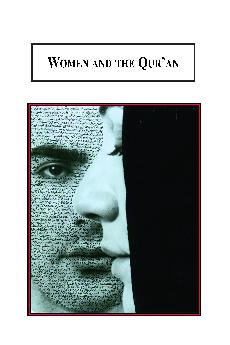Women and the Qur'an: A Study in Islamic Hermeneutics
We are currently unable to ship to the EU countries at this time. We apologize for this inconvenience.

| Author: | Davary, Bahar | |
| Year: | 2009 | |
| Pages: | 192 | |
| ISBN: | 0-7734-3858-0 978-0-7734-3858-3 | |
| Price: | $159.95 + shipping | |
| (Click the PayPal button to buy) | ||
This work argues that a link between the modern consciousness of woman and the Qur’anic discourse can be established only by revealing the historical continuity in the language formation in the image of woman.
A resource for addressing this issue can be found in the discussion of modern hermeneutics. The central theme of modern hermeneutics is to examine the historical continuity between the text and its interpretations.
The work of Hans-Georg Gadamer, a contemporary German philosopher who is influential in the hermeneutical ontology of language in both North America and Europe, provides the framework for this discussion.
A resource for addressing this issue can be found in the discussion of modern hermeneutics. The central theme of modern hermeneutics is to examine the historical continuity between the text and its interpretations.
The work of Hans-Georg Gadamer, a contemporary German philosopher who is influential in the hermeneutical ontology of language in both North America and Europe, provides the framework for this discussion.
Reviews
“Prof. Davary differentiates her approach from most feminist ideologies by avoiding the trap of the notion of unity or identity. She brings forward the differences between men and women not by separating them as different identities, but rather by putting them into constant dialogue within an open
communicative space. This is a dialectical relation of differences around a common subject matter. The most critical point in her study is that differences between text and interpretations, men and women, past and present cannot be subsumed under a general conception of oneness or unity.
Thus the language that Prof. Davary employs in this book is not representational, but rather dialogical. The success of her study lies in her ability to critique some traditional and modern metaphysical and ideological approaches toward the Qur’an and woman without falling into the trap which she criticizes. Most modern Islamist or Muslim feminists tend to turn classical approaches upside down, by claiming to represent “identity” in their own language.” – Prof. Burhanettin Tatar, Ondokuz Mayis University in Turkey
Thus the language that Prof. Davary employs in this book is not representational, but rather dialogical. The success of her study lies in her ability to critique some traditional and modern metaphysical and ideological approaches toward the Qur’an and woman without falling into the trap which she criticizes. Most modern Islamist or Muslim feminists tend to turn classical approaches upside down, by claiming to represent “identity” in their own language.” – Prof. Burhanettin Tatar, Ondokuz Mayis University in Turkey
Table of Contents
Foreword by Prof. Burhanettin Tatar, Ondokuz Mayis
University in Turkey
Introduction
1. Tabari: The Classical Approach
The Creation Story and the Language of the Qur’ an
The Elaboration of the Creation Story
Guile, Love, and Lust
Autonomous vs. Subordinated Morality
Marriage, Polygamy, and Disruption of Marital Harmony
2. Fakhr al-Din Razi: The Grand Commentary
The Creation Story
Morality, Immorality, and Gender
Marriage and Divorce
Conclusion
3. ’Abduh: Accommodating Tradition with Modernity
The Creation Story as interpreted in Al-Manar
Women’s Guile
Polygamy and Divorce in Al-Manar
4. Tabataba’i: Contemporary Shia Tafsir
Creation ex nihilo or Evolution
Women: Spiritual Beings or a Threat to Men’s Spirituality?
“Men are maintainers of Women”?
Marriage and Divorce
The Case of Polygamy
Conclusion
5. If Our Past is Present, How Can We Get to the Future?
Remembered or Useable Past
Women and Interpretation of the Qur’an
Feminist Interpretations of the Qur’an
CONCLUSION
“Forgetfulness of Being” and the Futurality of Dasein
Glossary
Bibliography
Index
Introduction
1. Tabari: The Classical Approach
The Creation Story and the Language of the Qur’ an
The Elaboration of the Creation Story
Guile, Love, and Lust
Autonomous vs. Subordinated Morality
Marriage, Polygamy, and Disruption of Marital Harmony
2. Fakhr al-Din Razi: The Grand Commentary
The Creation Story
Morality, Immorality, and Gender
Marriage and Divorce
Conclusion
3. ’Abduh: Accommodating Tradition with Modernity
The Creation Story as interpreted in Al-Manar
Women’s Guile
Polygamy and Divorce in Al-Manar
4. Tabataba’i: Contemporary Shia Tafsir
Creation ex nihilo or Evolution
Women: Spiritual Beings or a Threat to Men’s Spirituality?
“Men are maintainers of Women”?
Marriage and Divorce
The Case of Polygamy
Conclusion
5. If Our Past is Present, How Can We Get to the Future?
Remembered or Useable Past
Women and Interpretation of the Qur’an
Feminist Interpretations of the Qur’an
CONCLUSION
“Forgetfulness of Being” and the Futurality of Dasein
Glossary
Bibliography
Index
